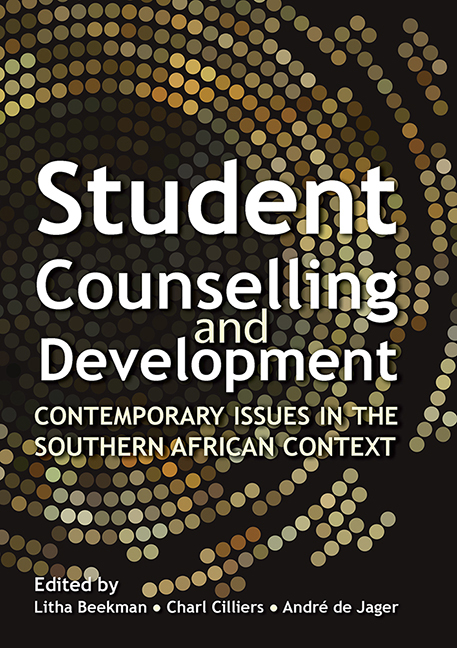Book contents
- Frontmatter
- Contents
- Figures
- Tables
- Preface
- Section 1 Development of Student Counselling and Development in Southern Africa
- Section 2 Theoretical Foundations of Student Counselling and Development in Higher Education
- Section 3 Services and Programmes Provided by Student Counselling and Development Units
- Section 4 Student Counselling and Development For Special Groups
- Section 5 Quality Assurance and Ethical and Professional Issues
- Contributors
- Index
Chapter 1 - Historical Overview
Published online by Cambridge University Press: 22 February 2020
- Frontmatter
- Contents
- Figures
- Tables
- Preface
- Section 1 Development of Student Counselling and Development in Southern Africa
- Section 2 Theoretical Foundations of Student Counselling and Development in Higher Education
- Section 3 Services and Programmes Provided by Student Counselling and Development Units
- Section 4 Student Counselling and Development For Special Groups
- Section 5 Quality Assurance and Ethical and Professional Issues
- Contributors
- Index
Summary
INTRODUCTION
To introduce this chapter, reference is made to a South African theoretical and philosophical perspective, the international context of Student Counselling and Development (SCD) and its roots in South Africa. Following this introduction, the establishment and development of SCD in South Africa is discussed in three chronological developmental phases. These are the reactive phase, the proactive phase and finally the integrative phase. The integrative phase is current and refers to the scope of SCD, its current definition and its core competences. This is followed by a conclusion to the chapter.
The author of any text which strives to provide an historical overview needs to declare his or her subjective viewpoint. In the South African context, in particular, a critical reader of such text would immediately want to know from whose perspective history is being reported. Within the context of the SCD profession with its rich but volatile history its proponents will most certainly ask this question, and very critically. The reader is therefore reassured from the outset that every effort has been made to write this chapter from the perspective of the current South and Southern African SCD philosophical viewpoint. This reflects the principles of democracy which underlie the South African Constitution (RSA, 1996) and also the higher education (HE) system. Fundamental to this philosophy is the inalienable right of every individual to fundamental human dignity and respect.
South African perspective
The overview in this chapter covers 60 years of growth of SCD in South and Southern Africa. While it allows space for all perspectives, it places an emphasis on the growing African and global context in which SCD increasingly operates.
It is commonly held that traditional Western perspectives initially dominated SCD. Traditional Western training models were mainly used in, by and for SCD. It is also commonly held that noticeable shifts in SCD have occurred during the 15 or so years since South Africa's political transformation.
The main thrust of this has been the shift away from a traditional, mainly Western and modernist understanding of a human person with an emphasis on individualism and rationality. Instead, in the coming together of cultures under the umbrella of the new South African democracy, there has been a growing emphasis to include the concept of ubuntu.
- Type
- Chapter
- Information
- Student Counselling and DevelopmentContemporary issuesin the Southern African Context, pp. 3 - 17Publisher: University of South AfricaPrint publication year: 2012
- 3
- Cited by



